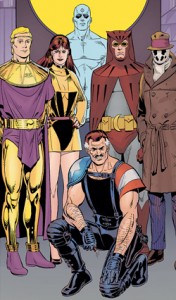
Quis custodiet ipsos custodes?
Roman poet Juvenal wrote these words in his Satires, translating to the eponymous quandary:
“Who watches the watchmen?”
In the mid 1980s, Alan Moore and Dave Gibbons created the twelve book series Watchmen, changing not only the face of the superhero, but revolutionizing comics. Both of us (along with countless other people around the world) love Watchmen, and gearing up for the movie release on Friday we’ve decided to pay homage to this breathtaking book.
Instead of writing a review proper (do you really want to give us that kind of free reign to write a dissertation on this landmark work of literature?!), we’re doing something different. We’ll talk about the main characters, and then answer some discussion questions – and we invite everyone to participate as well! Fellow longtime fans, new fans, or even folks who have not yet read the book but think the previews look awesome – please feel free to share your own insights!
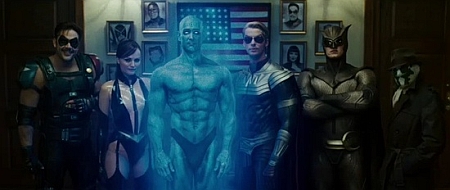
For those that have not read the comics, here is the brief synopsis:
It all begins with the paranoid delusions of a half-insane hero called Rorschach. But is Rorschach really insane or has he in fact uncovered a plot to murder super-heroes and, even worse, millions of innocent civilians? On the run from the law, Rorschach reunites with his former teammates in a desperate attempt to save the world and their lives, but what they uncover will shock them to their very core and change the face of the planet! Following two generations of masked superheroes from the close of World War II to the icy shadow of the Cold War comes this groundbreaking comic story — the story of The Watchmen.
The Characters
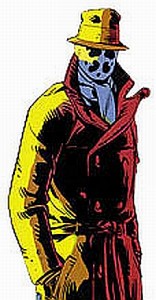
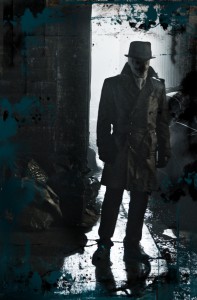
Moniker: Rorschach
Real Name: Walter Kovacs
Modus Operandi: The only masked vigilante to refuse to give up the mantle after the passing of the Keene Act outlawing them, Rorschach prowls the rooftops of the city and metes out justice as he sees fit. He hates the sniveling people that make up his city, but despises the amount of crime more. Like all the other characters besides Doctor Manhattan, Rorschach has no super-powers. He’s brilliant, quick witted, but completely paranoid and unstable.
Rorschach believes in absolutes: good and evil, right and wrong, communist and partiotist. His refusal to give up his pursuit of these ideals, even in the face of apocalypse, reflects this iron clad belief system.
I got Issues: Stemming from his childhood, his mother was a prostitute who frequently told Walter that he was ugly, worthless and she wished she had aborted him. Suffering from an almost Oedipal complex, Walter hated and desired his mother, eventually being taken from his home at a young age after brutally beating two boys in school. Rorschach would grow up to work as a tailor for women’s clothes (though from his narrative it is clear his loathing of women and repressed sexuality is a part of him), and it is here that he comes across the always shifting, beautiful white and black fabric that will become his true face.
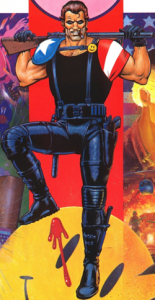
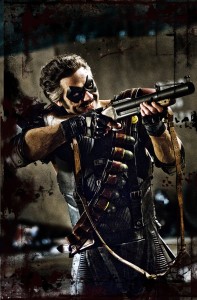
Moniker: The Comedian
Real Name: Edward Blake
Modus Operandi: Brutal, cynical, and ruthless, Blake is murdered by an unnamed intruder as the book begins. Through flashbacks from each of the other main characters, we learn that Blake was a soldier, a fighter, and perhaps of all his colleagues best understood the nature of mankind and what would be needed to stop humanity from rushing to the brink of extinction. When the Keene Act was passed, Blake and Doctor Manhattan remained as the only two government sanctioned heroes, fighting together in the Vietnam War. A right wing extremist and a man who loved to fight for the hell of it, Blake agreed to become under the governments employ in part because it allowed him to thrive in his natural habitat: war.
Perhaps the most unrepentant, unlikable character of the bunch, the Comedian is killed because he sees something more terrifying and worse than any of the evils has has inflicted on others (murder, rape, etc). He breaks down and is prepared to stop this apocalyptic plot and has some humanity restored to his bleak character. Rorschach says it best in his journal…
Blake understood. Treated it like a joke, but he understood. He saw the cracks in society, saw the little men in masks trying to hold it together. He saw the true face of the twentieth century and chose to become a reflection, a parody of it. None else saw the joke. That’s why he was lonely. Heard a joke once: Man goes to doctor, says he’s depressed. Says life seems harsh and cruel. Says he feels all alone in a world where what lies ahead is vague and uncertain. Doctor says “Treatment is simple. Great clown Pagliacci is in town tonight. Go and see him. That should pick you up.” Man bursts into tears. Says “But doctor…I am Pagliacci.”
I got Issues: With brutality, with women. His attempted rape of Sally Jupiter, the original Silk Spectre, leads to complications with Laurie; he also kills for sport in Vietnam, rapes and impregnates – then disfigures – local women. He doesn’t play well with others either.
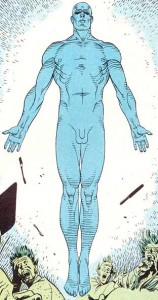
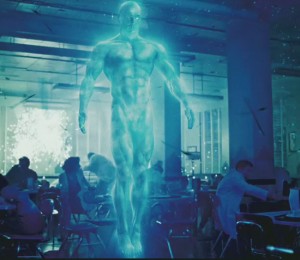
Moniker: Doctor Manhattan
Real Name: Jon Osterman
Modus Operandi: Dr Manhattan is the only real super-hero of the group. In true comic book fashion, Jon suffered an accident when he got trapped inside an “Intrinsic Field subtractor” an his body dissolved and everybody thought he died. He reassembles himself up particle by particle thus becoming the most powerful being in existence, capable of shaping and rearranging quantum particles. He can travel anywhere in the universe and he can create life. After the 1977 Act he becomes a contracted Super-hero for the US government, working as both weapon and scientist.
I got Issues: Well, for starters, he is blue. And he walks around naked. After reassembling himself, Jon has become something other than human – colder and perhaps even emotionless to outsiders, he still tries to keep a grasp of humanity by keeping friends and relationships with women. But at the end of the day, Dr. Manhattan does not perceive time or space as normal human beings do – which influences his detachment from humanity. He is quite probably bored with life and the universe since he can do anything and predict anything. He is pretty much, a God.
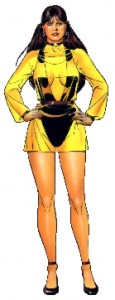
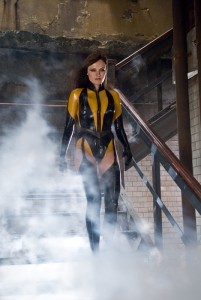
Moniker: Silk Spectre II
Real Name: Laurie Juspeczyk
Modus Operandi: Daughter of the first Silk Spectre, Sally Jupiter, Laurie assumes the Silk Spectre moniker after being pressured into the costumed hero career by Sally. The only female member of the Crimebusters, when she was younger she found the career sexy and exciting but grew to resent her role as a Crimebuster and her mother’s pushiness. Laurie enters a romantic relationship with Doctor Manhattan and lives with him on retainer as he works for the US government, until he leaves Earth and she turns to Dan Dreiberg (Nite Owl) for help and comfort. Laurie still enjoys the thrill of crime fighting, and along with Dan believes in Rorschach’s cause and stands with him.
I got Issues: Of the mommy & daddy variety. Laurie resents her mother’s focus on being a famous icon and sex symbol and her pressuring Laurie to be exactly the same, substituting a childhood with combat and gymnastics lessons, a prom dress with a spandex crime fighting costume.
Don’t even get started on the daddy revelation.
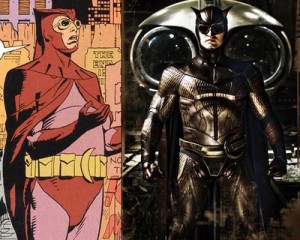
Moniker: Nite Owl II
Real Name: Dan Dreiberg
Modus Operandi: Dan Dreiberg is the second person to assume the moniker of Nite Owl. Out of all the Watchmen he seems to be the one that truly believes in the heroics of crime fighting. In other words: Nite Owl is the romantic of the group. He became rich after inheriting his father’s fortune and uses the money to build gadgets – an exo-skeleton, the Owlship etc – very much like Batman. He can fight and he is intelligent. And when he wants to, he can be quite dashing and smoldering (according to Silk Specter). Another interesting fact of Dan’s life is that he used to be partner with Rorschach who never forgave Dan for quitting too easily when the 1977 Act passed.
I got Issues: Dan has a keen interest in ornithology (ie birds and flying) and you wouldn’t be too far off in thinking that his Nite Owl identity is a way of connecting with the animals. After retiring in 1977 Dan becomes increasingly depressed and the perfect image of a dispirited, impotent (figuratively and literally) middle-aged man. It is only when he dons the Nite Owl costume that he gains self-confidence, passion and feels complete.
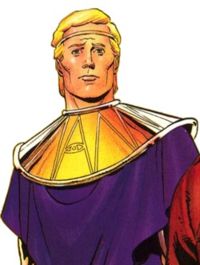
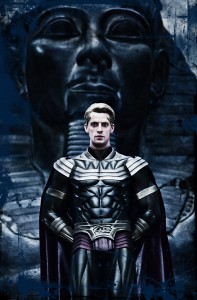
Moniker: Ozymandias
Real Name: Adrian Veidt
Modus Operandi: His hero is Alexander the Great who he sees as a visionary. Born to rich parents who left him their fortune when they died, Adrian gave it all away so that he could make his own fortune by his own merits. He becomes a self-made millionaire after retiring from the Watchmen. His moniker Ozymandias is another name for Ramses II the famous Egyptian pharaoh. Veidt is considered to be one of the most, if not THE most intelligent man on the planet . He is an expert in martial arts and has full physical capacity and control – he can even stop bullets with his own hands.
I got Issues: He sees himself as a mix of Alexander the Great and Ramses II and the saviour of the world. God complex much?
The Questions
1. Should the government sponsor or work with “superheroes” (as with Blake and Doctor Manhattan)? Should they exist beyond and above the law?
Thea: There are two outcomes to government sponsorship in Watchmen: Eddie Blake (the Comedian) and Doctor Manhattan. In the case of Blake, he uses government sponsorship to his heart’s content, fighting, killing, burning — thriving on chaos in something of a nihilistic attitude. He’s embraced as a war hero, a patriot, and by his bleaker costumed counterparts as a man who knew what the world was. Blake is the prime example why giving a blank check to anyone, costumed hero or not, is a dangerous thing. Conversely, Doctor Manhattan does his duty for his country though concepts like patriotism, world destruction, justice or freedom are lost on this omniscient creature.
I tend to be of the mindset that “superheroes” (yes, I’m using the term even though all of these costumed heroes do not have super powers with the exception of Doc Manhattan) should not be government tools. It is easy to become what Blake becomes, or even just a tool not necessarily serving justice but what is in the best interest of the government (heck, in Watchmen, Nixon is implicated in the death of Kennedy — as is Eddie Blake). Furthermore, Doctor Manhattan’s involvement in the Vietnam War drastically changes the outcome, and his being on retainer for the US Government as a walking “God” (“God Exists, and He’s American!” as the comics proclaim) skews and changes the political landscape of the world, heightening tensions between the US and the Soviet Union. Should any one country assume control of such a creature (considering the superhuman in question allowed to be claimed by a specific country, like Doctor Manhattan does)? In my opinion: no. As seen in Watchmen, even with the American advantage of “having” Doctor Manhattan, tensions are incredibly high internationally, and that doomsday clock is still ticks away. On both a micro and macro level, government agent superheroes (whether super or not) is dangerous and defeats the purpose of these costumed heroes — who should preserve justice for those without voices, not as puppets of any government.
Ana: This is an easy one: I agree with Thea. Bearing in mind the two examples from the Watchmen – The Comedian and Dr Manhattan – the use of superheroes by Government, any Government is dubious at the very least. Not only because one can never be sure on how they are going to be used by the Government but how exactly are they recruited? Who makes the rules and sets the limits – are there any limits at all (refer to Blake’s free reign of terror)?
The question of Government sponsorship also taps on the issue of secret identities and double life ie. The basic right for Privacy. Many of the super-heroes cover their faces for different reasons – for example, self-protection and of their relatives against vengeful villains. Super-heroes should have the right to conceal their identities if they so wish and a Government-sponsored cooperation can open up a can of worms and a witch hunt in which super-heroes and vigilantes may be one day required to register their secret identities or else. That is a dangerous precedent.
(Thea: A whole new can of worms. Hello, Civil War, Mutant Registration Act, etc!)
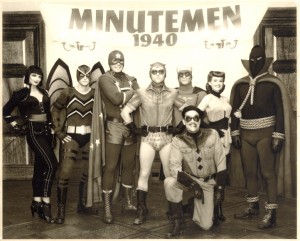
2. Who makes the decision to be a superhero? In Watchmen, regular people with regular people baggage and issues don costumes and fight crime, but should they be allowed to do so? If our heroes are as fallible as regular people, are they really heroes?
Thea: Alan Moore literally changed the genre with Watchmen, deconstructing the infallible “superhero” and making them humans with human neuroses and issues, and then exploring these issues. Should Rorschach, the Comedian and Ozymandias be allowed as costumed heroes fighting for mankind given their intense psychological baggage and very human frailty?
I say…yes. Though there are a number of these costumed heroes that don a cape and colorful costume because it’s fun and sexy and dangerous, there are those, like Rorschach, who truly believe in what they are doing — and for better or for worse, they will do what that which they believe in. Sometimes the law fails, or extraordinary circumstances call for extraordinary solutions — which these so called superheroes can provide. As for whether or not regular people can be heroes, what’s to say that those with superpowers are not just as troubled psychologically?
Do we not already have crazy police officers, corrupt politicians, blood-driven soldiers and power-crazed mob bosses? Like any other profession, masked heroes are composed of real human people — and for every crazed loon (or Rorschach, Ozymandias, Comedian), there is an orignal Nite Owl, the new Nite Owl, or a Batman for that matter.
Ana:I say…no. Listen, Rorschach, the Comedian and Ozymandias are all batshit INSANE and I would NOT want them to fight for my life. The prospect of having a hooded avenger fighting crime because he gets off out the violence is utterly terrifying. If vigilantes are only regular people, with regular baggage, and regular neuroses and they want to fight crime what’s stopping them from joining the police? Or the marines? Or becoming lawyers or judges? OK, you can argue that there is corruption and the law fails and policemen are fallible too. Fair enough. It’s frustrating, I get it. But it has been proven over and over again that vigilantism/Superheroism is not the solution. Vide: the Watchmen and the Batman.
And yes, real superheroes with real superpowers can be troubled psychologically too but they are super. They ARE different. They cannot join the marines, as they are something else entirely. There is no choice for them other than to become super-heroes (or super-villains).
(Thea: Under certain legislation, superheroes DO join civilian type of jobs — i.e. The Initiative, S.H.I.E.L.D., etc. And I would rather have humans with human neuroses than say, a Doctor Manhattan character with his absolute power corrupted absolutely!)
3. If, as in Watchmen, public opinion turns against superheroes and outlaws them, is there a need for vigilantes to keep justice?
Thea: There’s a precedent for vigilantism throughout history, from Rome to the American West to present day. In a cracking society where good hardly ever triumphs over evil, vigilantes serve to restore order and help a society inept to deal with crime.
Of course, it could also be argued that hate groups such as the KKK are vigilantes, so there is a problem of morals and ethics, especially in the definition of what makes a vigilante. Who is allowed to be a vigilante and for what cause? Which morals are “better” than others? It’s not a question with easy or clean cut answers, but I think people just have to do the best they can. Including vigilantes.
Ana: But what is exactly “the best they can”? Morals and ethics are not Absolute principles – they are relative: in time, space, culture. I think this is one of the most complicated questions – and I think even if there WAS the need for vigilantes, they shouldn’t exist.
There is certainly an allure to the figure of the vigilante – the lone figure that rises to help. But that points to society’s problems in dealing with its own shortcomings. It’s like people need to be saved – instead of making changes and effectively progressing towards an (utopic?) society that will have no need for superheroes they prefer to rely on the masked ones. It’s like society is divided in two kinds of people: the ones with inferiority complex that need to be saved and the ones with enough superiority complex to save them.
(Thea: But there ARE vigilantes and have been throughout history, not just in comic books (or literature like Robin Hood for example). The bounty hunter, the gunslinger, samurai, knights, etc. In extreme situations where society will not or cannot do anything to help its citizens, vigilantes seem to emerge, for better or for worse. As for people with inferiority versus superiority complexes, I don’t think this is true at all. There are people that simply cannot defend themselves. For all that I can perform some mean statistical analysis, if I was caught in a dark alleyway and cornered by a bigger, stronger dude, I would most likely come out of that confrontation on the losing end — and this is a micro-application of a much larger problem. That’s the beauty of Watchmen, taking these larger world issues and instead of condensing it to a woman in a dark alley scenario, it keeps it on that larger level with rising cold war tensions and the world on the brink of mutual destruction. I don’t think this has anything to do with people needing to be saved or people needing to save others — that’s a psychological simplification of a much deeper, less clean cut question.)
(Ana: but dude, at the end of the day our discussion here is a simplified one isn’t it?: “Is there a need for vigilantes to keep justice”: the key word for me here being “need” and the people that simply cannot defend themselves need salvation. If everyone would fight for their rights there would be no need for Robin Hood to feed them, for the gunslinger to protect them, for the samurai to fight their fights. Get your stones, your balls , your voice and do it yourself. The power of the people dude. Again, probably very utopic but my point here is: no, there should be no need for Vigilantes. People should instead fight for a fair society and for a system that is not corrupt and not expect for someone to come and save them.)
(Thea: In such a uptopic society, you’re right, there would be no need for Vigilantes…but I live in the real world and there are no utopias. Come down to Earth here with me, you Ozymandias! Like Doctor Manhattan says, nothing is final. Hence, why we have had and continue to have vigilantes, throughout our troubled history as a brutal species.)
(Ana: Step away from me Rorschach you are one crazy mofo.)
4. What is the difference between a “hero” and a “vigilante”? Or for that matter, what is the difference between a vigilante and a villain?
Thea: To me, a “hero” exists within the context of the law, whereas a “vigilante” by definition is an outsider who breaks the law in order to serve justice. The line between vigilantes and villains is much blurrier — vigilantes are criminals by definitions and villains are by definition criminals. However, a vigilante believes what they do is for the good of society, whereas villains need not this distinction. Vigilantes can be villains, however — arguably Rorschach is a villain because of his brutal and unyielding beliefs. Rorschach could be a heroic character too, however despite his cold detached relentlessness. It’s another tough call.
And, to be fair, I don’t believe that “heroes” — free of ego and personal gain, these golden men and women who are too good to be true — truly exist. They are fictional superheroes, like Superman or Wonder Woman. Even those human characters with the best of intentions, i.e. oh…Jack Shephard a la LOST is more driven by his God-complex and need to “fix things”. That’s again the beauty of Watchmen! These simple, black and white views of superheroes, with heroes being infallibly good and better than life are cast asunder in this book. The superhero is completely deconstructed, to something much more gray and malleable instead.
Ana:Call me cynical but the way I see it, more often than not a vigilante rises out of an extreme situation impelled by personal feelings. What tips them to finally take a stance and serve justice is usually something very personal as opposed to a true hero who is motivated by a less egoistic drive. There is certainly the issue of law x justice and way a vigilant and a hero deal with each. I think Thea is spot on what is the difference between a vigilante and a villain: their belief in what they do for the greater good of society or not.
It should be noted though that when it comes to reading or watching, I much prefer to read about the dark, troubled vigilante (Batman or Rorschach) and the Villain (Joker) than the boring noble hero (like Superman).
5. Is it better to repeatedly capture a villain and turn him over to the authorities for incarceration even though he keeps escaping and killing more people as a result (i.e. The Joker), or does it just make more sense to kill the bad guys before they strike again–especially if the law and prisons continue to fail (i.e. The Punisher)?
Thea: Oooooh, here’s where things can get interesting. Honestly, after reading many Batman stories and seeing as the Joker continues to be unleashed and allowed his reign of death and terror, it begs the question: WHY? Yes, I know the argument is that killing the Joker makes Batman no better than the criminals he apprehends, this is the line he must not cross. On the flip side, there are the characters of Ozymandias and Rorschach (or The Punisher, or Manhunter) that kill as a means to an end. In all honesty, I don’t believe in an eye for an eye (I’m against capital punishment). I can understand why this is appealing and I like reading about different brands of vigilante heroes and villains that cross this line…but I tend to still side with the Batman.
Ana: I’m against capital punishment as well. I know it can be frustrating and infuriating sometimes. Of course, this coming from a strictly cold and detached point of view. I don’t know what I would think if I was to be locked inside a room with someone that had killed an innocent baby for fun and I had a gun. I’d like to think I would still not cross the line. So yeah, siding with Thea and the Batman on this one as well.
Want More Watchmen?
Check out these sites.
http://watchmenmovie.warnerbros.com/
http://www.thenewfrontiersman.net/
http://www.i-watch-the-watchmen.com/ww/
And, just for kicks…here’s all 10 video spots for Watchmen:
NEXT ON WATCHMEN WEEKEND: EVER WONDERED WHAT WOULD HAPPEN IF YOUR FAVORITE BLOGGER DECIDED TO FIGHT CRIME? FIND OUT TOMORROW.










2 Comments
Ana
March 5, 2009 at 1:02 pmPoor, poor lonely post 🙁
I will keep you company. 😆
Dude where did you find that awesome picture of the Minutemen? *highfive*
Thea
March 5, 2009 at 2:31 pm*streaks through comment thread*
😆
The Minutemen pic is from the movie stills! There are a bunch available here:
http://www.watchmencomicmovie.com/watchmen-movie-photos.php